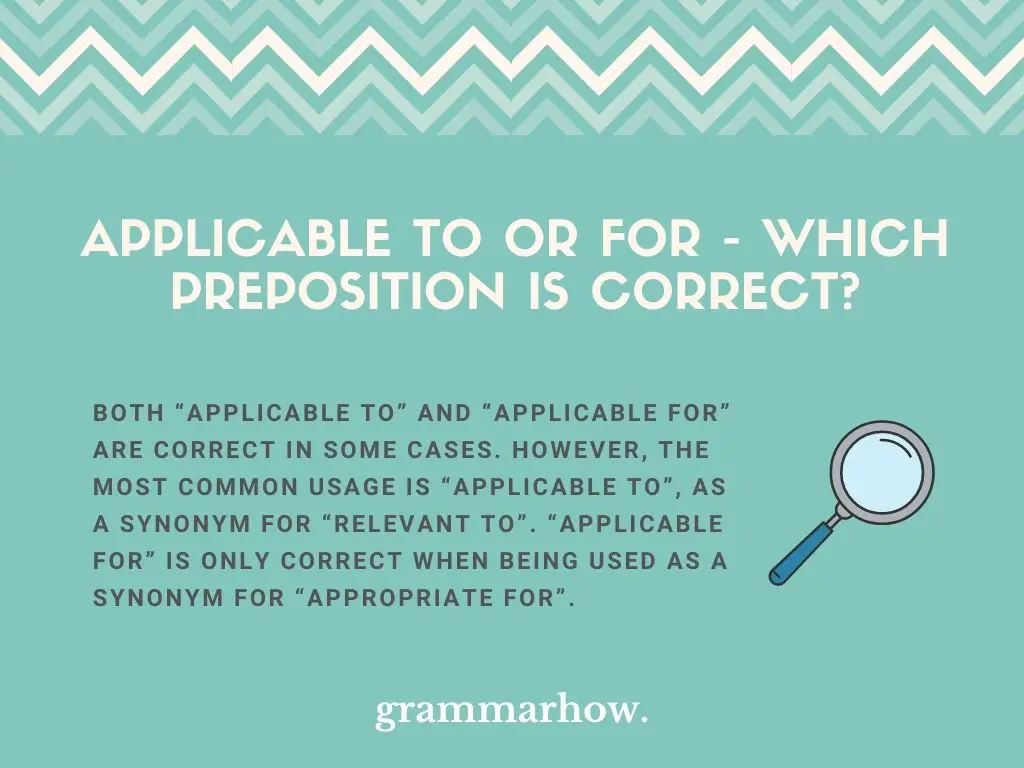Are you writing a text or email and are about to use the word “applicable”? Now you’re suddenly in doubt if it should be applicable “to” or “for”.
This is a completely understandable situation, so in this article, we’ll teach you which preposition is correct.
Applicable To or For – Which Preposition Is Correct?
Both “applicable to” and “applicable for” are correct in some cases. However, the most common usage is “applicable to”, as a synonym for “relevant to”. “Applicable for” is only correct when being used as a synonym for “appropriate for”.

The easiest way to know the right preposition to use with “applicable” is to know its synonyms. “Applicable” means “relevant” or “appropriate”. Replace the word “applicable” with the right synonym, and it’s easy to determine the correct preposition to use.
Consider the following sentences:
- This question is not applicable to you.
- This starting point is applicable for future tests.
The first sentence uses “applicable” to mean “relevant”. It makes sense to say something is “relevant to” you. But the second sentence uses “applicable” as “appropriate”. It makes more sense to say, “appropriate for” than “appropriate to”.
If you are in doubt about which preposition to use, “applicable to” is usually the right answer. We know how confusing this may sound, so continue reading if you’d like a deeper explanation.
Applicable To
“Applicable to” is the right phrase when using “applicable” to mean “relevant”. If something is applicable to someone, it’s relevant to them. This often comes up on surveys and submission forms.
This also means that things can be “not applicable” to you. After all, not everything is relevant to everyone.
Below are some examples:
- Taxes are not applicable to children.
- As a student, financial aid is applicable to me.
- Everyone has a race, so questions about race and ethnicity are applicable to everyone.
Replace “applicable” with “relevant” in these examples, and you’ll see it fits perfectly. Something that is relevant to someone is “applicable to” them. Something that is not relevant to someone is “not applicable to” them.
This is the most common usage of “applicable”, and the one you will see most often. It comes up on many forms and documents.
Applicable For
“Applicable for” is correct when “applicable” is being used as a synonym for “appropriate”. This usage is not as common as “applicable to”. However, it is still correct. If the subject you are discussing is “appropriate for” something, you can say it is “applicable for” it.
For instance, consider the following examples:
- The concept of sportsmanship is applicable for all sports.
- These legal charges are applicable for the crime in question.
- Critical thinking skills are applicable for all situations.
You can replace “applicable” with “appropriate” in all of these sentences and still have the same meaning. This is when it’s right to use “for” instead of “to”.
But most just use “appropriate” instead of “applicable” in such cases. That’s because “relevant” is more commonly associated with the word “applicable”. Most people think of the word that way.
“Applicable for” is still right in this context, but it’s not a common usage, so keep that in mind. Most of the time, you won’t be using this phrase, even if it has its place.
Conclusion
“Applicable” has two main meanings, which are “relevant” and “appropriate”. Whether you should use “to” or “for” depends on which meaning you’re using. Both are right in certain contexts.
If using “applicable” to mean “relevant”, the right choice is “to”. This usage is more common. It’s the one most people think of when using this word.
But if using “applicable” to mean “appropriate”, the right choice is “for”. This usage is less common, but still has a time and place. Just remember the right time to use each preposition, and you’ll be fine.

Martin holds a Master’s degree in Finance and International Business. He has six years of experience in professional communication with clients, executives, and colleagues. Furthermore, he has teaching experience from Aarhus University. Martin has been featured as an expert in communication and teaching on Forbes and Shopify. Read more about Martin here.
